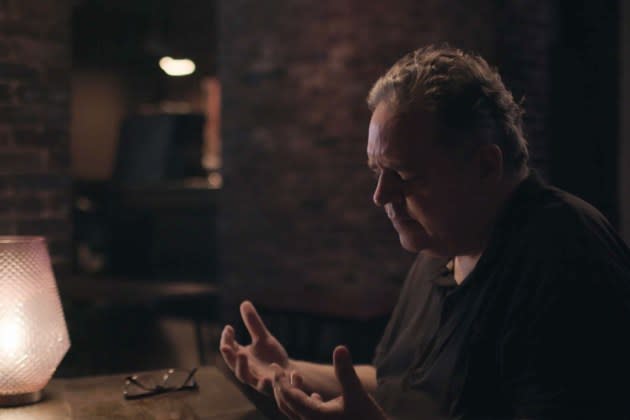‘Look Into My Eyes’ Review: Psychics Shed the Mystique in a Funny, Compassionate Doc Portrait
- Oops!Something went wrong.Please try again later.

“Look Into My Eyes” opens with an unexpectedly sobering, even provocative encounter for a documentary about New York City psychics and their clientele: not a fanciful palm reading or a conjuring of a lost loved one, but an attempt to reckon with long-festering professional trauma. A middle-aged female doctor, sharply dressed, talks directly to camera — or rather, to the mystic sitting silently behind it — about the time, as a junior doctor on the emergency ward, she attended to a 10-year-old girl who was shot upon leaving church, and died of her wounds in hospital. The tragedy hasn’t left her mind in the 20 intervening years; seeking closure, she resorts to most unscientific methods. Can the psychic reach the young victim, she asks, and find out if she’s at peace?
Viewers will react in a variety of ways to this odd, upsetting request. Some may find it poignant, others thoroughly unseemly, and that’s before we get to the varied perceptions of psychics themselves: as uncannily gifted healers, performative charlatans, or something therapeutically in between. “Look Into My Eyes” entertains all these possibilities without being especially concerned with moderating that debate. Of markedly more interest to Wilson — returning successfully to more low-key human portraiture after two glossy celebrity studies, “Pretty Baby: Brooke Shields” and the Taylor Swift-focused “Miss Americana” — is how these allegedly second-sighted folk function on an everyday basis, and what drives ordinary people of many different persuasions to seek out their services.
More from Variety
Sundance 2024 Takeaways: Fewer Oscar Movies, Slower Sales and Some Horror Hits
IFC Films, Sapan Studio Buy 'Ghostlight' Following Critically Acclaimed Sundance Debut (EXCLUSIVE)
The resulting film, an A24 production launched at Sundance, walks a deft line between the ironic and the honestly receptive: Hardline skeptics will be entertained, others peculiarly affected. A gentle strain of humor, meanwhile, spans the divide. You needn’t have a firm stance on the afterlife and its accessibility to be tickled by a pet medium bragging that she could diagnose a cat’s urinary tract infection through sheer telepathy.
The seven psychics that Wilson has assembled to interview and observe are a diverse group — four of them women, three men; four people of color, three white — with an equally varied range of approaches to their chosen calling, from New Age-y solemnity to fairground-style showmanship and sparkle. (That would be Sherrie Lynne, who dresses for work in a surfeit of bohemian bangles and scarves, openly acknowledging the artifice and theatrics of a spiel she largely performs at parties.) What they mostly have in common is a shared interest in the arts: That several of them are aspiring actors or writers is a detail that cynics will relish.
Yet none of the subjects appears to brings any cynicism to the table — even as a couple of them, intriguingly, admit they may not have paranormal capabilities. Ilka Pinheiro cheerfully cites the usefulness of her thespian training when doing readings, while queer psychic Per Erik Borja confesses, “I never fully believe in the things I say.” Still, their consultations with clients, many of whom are vulnerable and desperate to regain missing connections, are marked by sincere human engagement and eagerness to heal. Some of the appointments — filmed on bare sets in clean, flat close-up, an aesthetic choice that stresses both their separation from reality and their plain emotional stakes — unfold in deadly earnest. In others, one senses both psychic and client building a shared fiction that nonetheless brings comfort. “If it resonates with the person I’m talking to, then it doesn’t fucking matter,” one shrugs.
Eventually, however, Wilson and DP Stephen Maing move past these formally constructed sequences of the psychics in session to probe their private lives, adopting warmer, looser vérité framing in the process. It’s here, in the privacy of their own New York apartments — some shrine-like in their tidiness, others cluttered shoeboxes — that their own emotional frailties come to the fore. And so they let loose about familial resentments, bad breakups, long-term grief and crises of either faith or atheism, all factors in steering them toward their strange line of work.
Wilson is an unobtrusive but subtly penetrating interviewer: She gets disarming candor even from an outwardly anxious subject like Eugene Grygo, a trauma-burdened soul who isn’t the most confident of the psychics, but comes into his own when talking about movies (Walter Salles’ arthouse tearjerker “Central Station” is a favorite) or, somewhat surprisingly, crooning Billy Joel or The Beatles at open-mic nights. Psychics, it turns out, are just regular damaged people with, perhaps, a less conventional coping strategy than most. Yes, they also see psychics themselves; a group therapy session between the seven brings proceedings to a rather tender climax.
With this view behind the curtain, the consultation scenes begin to take on a greater naturalism. The two modes merge in a moving, mordantly funny scene where young Asian-American psychic Michael Kim is surprised to find his next client is an old classmate, seeking a line to a dead mutual acquaintance. He’s sufficiently thrown off his game to offer clumsier counsel than usual: In one particularly awkward moment, his query as to whether the dead man had “breathing issues” is answered by the revelation that he hanged himself. And yet their meeting, cosmically assisted or not, ultimately proves openly conversational, even cathartic. Does it matter if they touch the beyond or not? Agnostic but empathetic, Wilson’s film suggests communing with the dead may just be a roundabout way of reaching the living.
Best of Variety
Sign up for Variety’s Newsletter. For the latest news, follow us on Facebook, Twitter, and Instagram.
